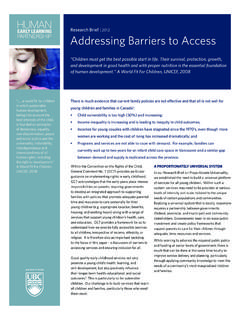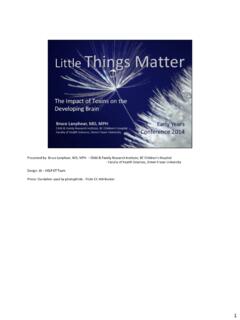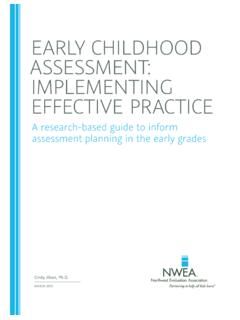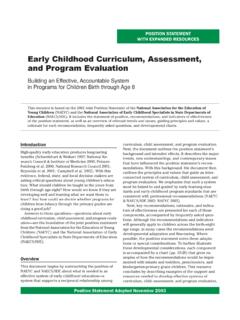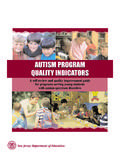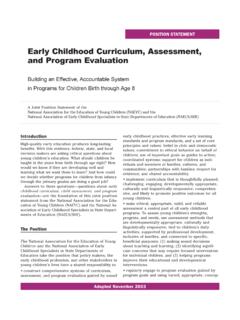Transcription of Factors Influencing Early Childhood Development (ECD)
1 August 13, 2014 [ Early Childhood Development LITERATURE REVIEW] 1 Human Early Learning Partnership contact: Michele Wiens SUMMARY Factors Influencing Early Childhood Development (ECD) August 13, 2014 Prepared for the Trail Area Health and Environment Committee (THEC) By Michele Wiens Human Early Learning Partnership School of Population and Public Health, Faculty of Medicine University of British Columbia 2206 East Mall, Vancouver, BC V6T 1Z3 August 13, 2014 [ Early Childhood Development LITERATURE REVIEW] 2 Human Early Learning Partnership contact: Michele Wiens SUMMARY: Factors Influencing Early Childhood Development (ECD) A bank of literature exists with respect to Factors that influence ECD, outlining significant Factors and providing strong evidence supporting a number of practices and programs.
2 The Harvard report (2010), The foundations of lifelong health are built in Early Childhood , provides a summary of the diverse influences on Early Childhood Development as well as a framework for action. 1 The foundations of lifelong health refer to three domains of influence that establish a context within which the Early roots of physical and mental well being are either nourished or disrupted: A stable and responsive environment of relationships. This domain underscores the extent to which young children need consistent, nurturing, and protective interactions with adults that enhance their learning and behavioural self regulation as well as help them develop adaptive capacities that promote well regulated stress response systems. Safe and supportive physical, chemical, and built environments.
3 This domain highlights the importance of physical and emotional spaces that are free from toxins and fear, allow active exploration without significant risk of harm, and provide supports for families raising young children. Sound and appropriate nutrition. This domain emphasizes the foundational importance of health promoting food intake. The literature review highlights ECD influences according to eight categories based on a published framework of child and youth health and well being indicators2: health and safety; education; material well being, equity; family and peer relationships; participation; subjective well being; behaviours and risks; and environment. Reviews were not evaluated for quality, however some general statements can be made, although these may be well understood in the field of ECD.
4 Each general statement below relates to the categories listed above, respectively: 1. Health and safety: Vital parenting practices include such elements as responsiveness, maternal infant interaction, breastfeeding, father s involvement, nutritional food choices, physical activity, and many more. 2. Education: Family literacy, language and numeracy interventions have a large impact on children s learning, health, and Development . 3. Material well being, equity: Material circumstances can exert a strong influence on children s well being. and elements such as housing and neighbourhood can help build an important foundation for a child s life. 4. Family and peer relationships: Infant mother/father relationships and children s relationships with family and peers are key to their well being.
5 5. Participation: Children s participation in after school programs and activities can contribute to healthy Development in physical, social, and emotional realms. 6. Subjective well being: Poverty, trauma, and inadequate treatment impact children s social, emotional and mental health. 1 Reference 44, SECTION V, REFERENCES (Main Document) 2 References 39 and 40, SECTION V, REFERENCES (Main Document) August 13, 2014 [ Early Childhood Development LITERATURE REVIEW] 3 Human Early Learning Partnership contact: Michele Wiens 7. Behaviours and risks: Physical activity and healthy eating are examples of healthy behaviours that contribute to children s well being, while risky behaviours such as substance abuse and aggression can have a negative effect on children s health and well being.
6 8. Environment: Environmental agents such as exposure to air pollution, persistent organic pollutants, heavy metals, second hand smoke, etc., are detrimental to children s Development . Although relationships between measures of natural space and positive emotional well being are weak and lack consistency, modest protective effects on health have been observed in small cities. Some key systematic reviews stood out with regard to their contribution to broadly answering the questions regarding Factors that influence healthy ECD. For example, Evangelou et al. s (2009) summary of the literature pertaining to Early years learning and Development is a comprehensive review of evidence in respect to the process of Development for children and best supportive contexts for children s Early learning and Readers wishing to utilize this literature review to further their understanding of ECD Factors are encouraged to consult the main document.
7 3 Reference 42, SECTION V, REFERENCES (Main Document)
